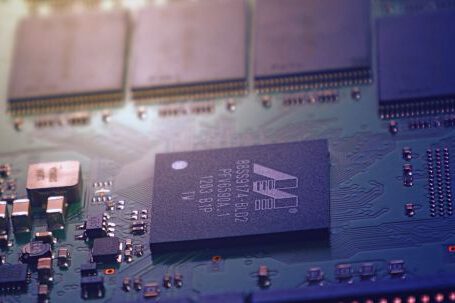In recent years, the concept of smart cities has gained significant attention. With advancements in technology, the idea of using artificial intelligence (AI) to manage various aspects of urban life has become a tangible reality. However, as we consider the potential benefits and implications of AI-managed smart cities, it is crucial to ask ourselves: are we truly ready for this transformation?
The Promise of AI in Smart Cities
AI has the potential to revolutionize the way cities function, making them more efficient, sustainable, and livable. With AI-powered systems, cities can optimize their energy usage, manage traffic flow, enhance public safety, and improve the delivery of essential services. By analyzing vast amounts of data in real-time, AI can help city officials make informed decisions that benefit both residents and the environment.
Enhancing Efficiency and Sustainability
One of the primary advantages of AI-managed smart cities is their ability to enhance efficiency in various domains. For instance, by utilizing sensors and data analytics, AI can optimize waste management processes, ensuring that collection routes are optimized and waste is disposed of in a sustainable manner. Similarly, AI can optimize energy consumption by monitoring usage patterns and adjusting supply accordingly, leading to significant energy savings.
Improving Public Safety
AI can also play a crucial role in enhancing public safety in smart cities. Through the integration of surveillance systems, facial recognition software, and predictive analytics, AI can help law enforcement agencies identify potential threats and respond to emergencies more effectively. Additionally, AI-powered systems can assist in optimizing emergency response times by analyzing real-time data and identifying the most efficient routes for emergency vehicles.
Challenges and Concerns
While the potential benefits of AI-managed smart cities are undeniable, there are also significant challenges and concerns that need to be addressed. One of the primary concerns is the issue of privacy and data security. As AI relies heavily on data collection and analysis, there is a need for robust measures to protect the privacy of individuals and ensure the security of sensitive information.
Another concern is the potential for bias in AI algorithms. If AI systems are not developed and trained with diverse datasets, they may inadvertently perpetuate existing biases and inequalities. This could have far-reaching implications, particularly in areas such as law enforcement and access to public services.
Moreover, the implementation of AI in smart cities raises questions about job displacement and the ethical implications of automated decision-making. As AI takes over tasks traditionally performed by humans, there is a need to ensure that adequate measures are in place to reskill and assist those affected by automation. Additionally, ethical guidelines and regulatory frameworks must be established to ensure that AI systems are used responsibly and in the best interest of society.
Conclusion: Striking a Balance
As we move towards the era of AI-managed smart cities, it is essential to strike a balance between embracing the potential benefits and addressing the associated challenges. While AI has the potential to revolutionize urban life, we must ensure that ethical considerations, privacy concerns, and the needs of all citizens are taken into account.
To fully embrace AI in smart cities, governments and policymakers need to invest in robust data protection measures, promote transparency in AI algorithms, and foster collaboration between technology developers, researchers, and citizens. Additionally, initiatives should be in place to reskill and support individuals affected by automation, ensuring that the benefits of AI are realized by all members of society.
Ultimately, the question of whether we are ready for AI-managed smart cities is not a simple one. It requires careful consideration of the potential benefits and challenges, as well as a commitment to ensuring that the integration of AI is done in a responsible and inclusive manner. Only then can we truly harness the transformative power of AI to create cities that are smarter, more sustainable, and more livable for all.





